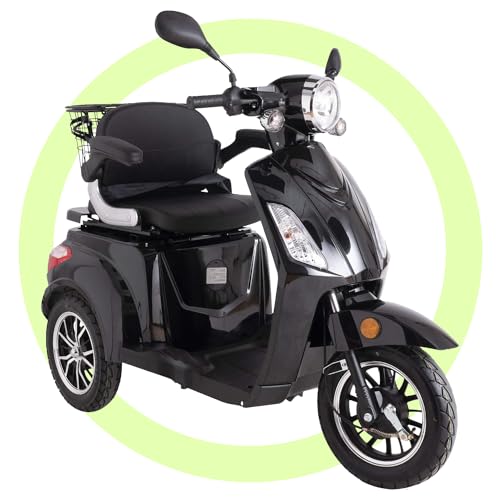Scooter Green Power

Scooters offer a fun and safe way to travel. They're also environmentally friendly. But, it's essential to research the product prior to buying one.
Despite being carbon-free scooters do have hidden costs. The mining and production of the batteries that power electric scooters produces significant emissions. The environmental impact of shipping scooters from charging stations to the point where riders take them is added.
Battery Life
The battery is among the most important components of any scooter, and it has a big impact on how green your scooter is. This is because when the battery fails it releases toxic chemicals into the air that can have a major ecological and economic impact.
Electric scooters are highly energy efficient, consuming only just a tiny fraction of the energy that cars do when driving the same distance. This can reduce the amount of pollution that is emitted into the air and also reduce climate change, and can also help to avoid congestion in traffic. However, they do produce a small amount of carbon dioxide when charging. If the energy is derived from renewable sources, this could make e-scooters even more eco-friendly.
Many scooters also come with interchangeable batteries that can be used to charge other scooters within a fleet. This means there is less necessity for companies to transport their scooters to recharge. Some companies are also testing with hyper-local energy production, enabling the grid to use the power stored in batteries to balance supply and demand.
If you plan to utilize your scooter for longer journeys you should consider buying an extra capacity battery or a second battery that you can swap out. You will be able to travel for longer distances without having to recharge the battery so often. This is crucial when you live in an area that experiences harsh weather conditions. It is also a good idea to charge the battery prior to when you store it for months or even weeks. If you don't it could be difficult for the battery to be able to hold a charge when you need it again. This can be both unpleasant and also risky.
Overall, electric scooters have a less environmental impact than other modes of transportation. They emit fewer greenhouse gasses that contribute to global warming, and they require less raw materials to manufacture. They can be powered by clean energy, which could reduce their carbon footprint. But, it is essential to think about the entire of a scooter when assessing its sustainability. This includes the production, the energy required to charge it and its disposal.
go green mobility scooters of electric scooters could have a big impact on their green power ratings. Scooters equipped with regenerative brake systems, like they convert energy that would be lost otherwise into extra battery life, allowing them to be more efficient in their charging. Many scooters can also be designed to travel shorter distances, thereby reducing the number of trips to the vehicle required. And, unlike traditional vehicles, scooters emit no carbon dioxide during use.
It is important to take into account the environmental impacts of electric scooters' entire lifecycle. This includes the extraction and manufacture of raw materials, as well as the end-of-life disposal. The production of lithium-ion batteries is particularly energy-intensive and can lead to habitat destruction, soil and water pollution and greenhouse gas emissions. The mining and transportation raw materials can have a significant effect on the environment.
Another problem with scooters is their inability to last. The average scooter only lasts about a month or two on the streets before being taken away. This could require scooter companies to extract more aluminum, and engage in more shipping and other activities that consume resources. And, since most scooters are rented, not owned, the scooters have to be taken to recharging stations (often by cars) when they run out of juice.
Scooters may contain hazardous wastes that could pose a risk to the public health and the environment. If greenpower electric scooters is not properly recycled, it could end up in landfills or rivers, where humans as well as wildlife are at risk.
Scooters are more beneficial to the environment as a whole than traditional vehicles. However there are some issues that must be taken care of before they can be deemed completely eco-friendly. If all scooters were constructed from 100% recyclable materials and if the energy they powered was sourced from renewable sources, then they would be a carbon-free mode of transportation.
Maintenance
A scooter powered by electricity may be less expensive than a conventional car however, it still requires routine maintenance. The battery pack is the primary component to think about. It will need to be charged regularly and replaced if it reaches the end of its life. The speed controller also is a factor as well. When this is faulty, it will affect the performance of the scooter.
When the scooter shuts off or stops while riding, it is usually a sign of a faulty battery pack. It could be a fuse or a charger that isn't functioning properly. Check that the charger's indicators are green (charging), not red (off). It's a good idea to recharge the scooter each time it's in storage, even if you don't use it.
A faulty normally closed switch on the brake lever is another common problem. To test this, disconnect the wire from the brake switch and then connect the terminals to the controller connector, where the wire was disconnected. If the scooter runs constantly, the switch may be malfunctioning.
Throughout the day, scooter services allow people to drive trucks or cars and return to their workspaces any electric scooter that has run out of power. This kind of service helps to keep the fleet in working in good condition. This allows them to recharge their batteries for the next trip. However, many people don't have this luxury and have to replace their scooters when they run out of juice while on the go.
